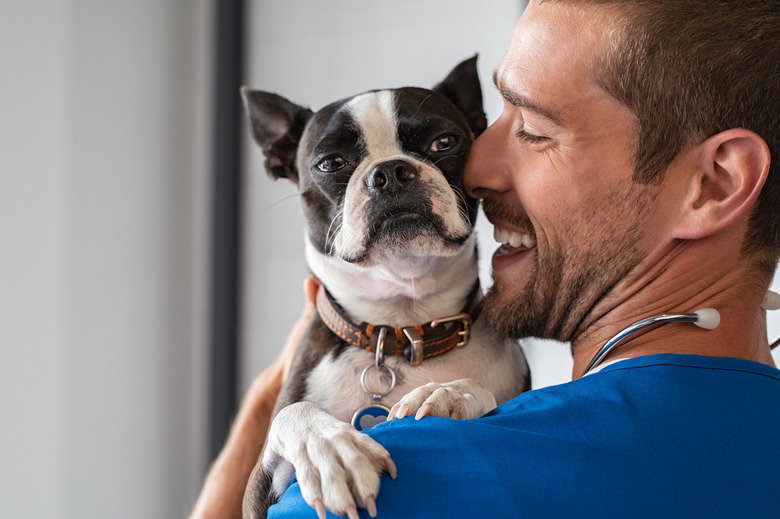Why Is My Dog Chewing On His Skin & Pulling Out His Hair?
Have you ever wondered, "Why is my dog pulling out their hair?" This is a symptom of itchiness. If your dog is pulling hair out of their tail, licking their paws, or chewing their skin, there's a good chance they have itchy skin. When your dog's behavior suggests signs of itchiness, it's worth investigating some factors in your dog's life to determine the cause.
Causes for a dog chewing or pulling out their hair
Causes for a dog chewing or pulling out their hair
Allergies to fleas, food allergies, or allergies to something else in the environment could result in this behavior. Other symptoms are a dog licking their feet or skin chewing. Common underlying causes are flea allergy dermatitis, food allergy, or atopy, which is environmental allergies (also called atopic dermatitis.) The itching tends to be concentrated on the face and the feet but can affect other parts of the body as well.
Dogs with atopy can also have a food allergy or flea allergy. Other causes of a dog biting at themself or itching are mites, such as Sarcoptes, Demodex, and Cheyletiella, and lice.
Dogs with allergies get inflamed skin, which may result in secondary bacterial infections, like hot spots and/or yeast infections that cause additional itching. The first step in diagnosing your dog's skin condition is to determine the underlying cause of why your dog is licking their paws, chewing hair off their leg, or pulling hair out of their tail.
Flea allergy dermatitis in dogs
Flea allergy dermatitis in dogs
Flea allergy dermatitis (FAD) is a leading cause of allergic reactions in dogs. A single flea bite can cause itching for days for a dog who is allergic to flea saliva. Even if you don't actively see a flea infestation on your pet, they could still be getting bit. Fleas are not always on the dog unless they are actually feeding.
FAD typically appears in young adult dogs. A common sign of a flea allergy is a dog pulling hair out from the lower back, like the base of the tail, up to the middle of the back and down the hind legs. Treatment requires a long-term commitment to flea control in order to keep them from biting your dog.
Food allergies in dogs
Food allergies in dogs
An allergy to dog food can develop at almost any age. In dogs with food allergies, the immune system reacts to certain components in food, called antigens, causing inflammation and itchiness commonly in the skin. The food antigens that dogs react to the most are proteins. These include beef, chicken, lamb, eggs, dairy, and wheat.
To test for a food allergy, your veterinarian will have you make strict changes to your dog's diet for a period of time to perform a food elimination trial. They will prescribe a special diet, and your dog must eat this dog food exclusively for a while in order to determine what the problematic ingredients are for your dog. Even things like vitamins, supplements, pet toothpastes, and treats must be considered as part of the elimination test.
Atopy (atopic dermatitis) in dogs
Atopy (atopic dermatitis) in dogs
If your dog is pulling out hair, chewing their skin, or constantly scratching, they may have atopy, or atopic dermatitis. This is caused by environmental allergies, like pollens, dust mites, and molds. Since avoiding these types of environmental allergens can be difficult, when a dog is diagnosed with atopy, treatment consists of controlling symptoms and the way the body responds to allergens. Because dogs can have atopic dermatitis as well as flea and food allergies, your veterinarian will likely also put your dog on a regular flea preventative and may suggest a trial with a new dog food.
When atopic dermatitis has been diagnosed, allergy skin tests can be performed. This is done with intradermal allergy testing (skin testing.) One side of your dog's thorax will be shaved. While your dog is under sedation, a small amount of numerous different allergens are injected into the skin in rows. Where there's a reaction, the pet is allergic to that particular allergen.
The goal of allergy tests is to develop allergy shots created specifically for your dog that will desensitize them to environmental allergens and make their symptoms more manageable. Your pet will have a regular series of shots given over a specified amount of time, usually directed by a veterinary dermatologist.
Home remedies for dog itching
Home remedies for dog itching
Never apply or administer any prescription or over-the-counter products to your pet without your veterinarian's approval. If you know what your dog is allergic to, one of the best ways to reduce allergy symptoms is to avoid the allergens triggering them. But that is generally not possible or realistic for dogs with environmental allergies.
Home remedies for dog itching include:
- Give more baths. But since over bathing can cause dry skin, which can also cause itching, talk with your veterinarian about how often to bathe your dog and with what. Don't use your own shampoo because a dog's skin pH is different than a human's.
- Omega-3 fatty acids. Talk with your veterinarian before starting any supplements.
- Supplements. Over-the-counter Benadryl Allergy. As with supplements, some dogs should not take Benadryl, so talk with your veterinarian first.
Veterinary treatments are almost always necessary for a dog chewing at themself. Anti-inflammatory medicines, medicated shampoos, and prescription sprays or creams that bring relief to your pet's skin problems may be needed.
The bottom line
The bottom line
A dog who is chewing at their fur or licking at themself is itchy. Some of the most common reasons for a dog's skin irritation are flea allergy, food allergy, and atopy, which is an environmental allergy. It's possible for your dog to have more than one of these skin conditions, and sometimes, they will also have secondary skin infections that can exacerbate hair loss and cause skin lesions. Your veterinarian will advise you on things like flea prevention, trying a new dog food, and products that can help calm your pet's skin disorder.


